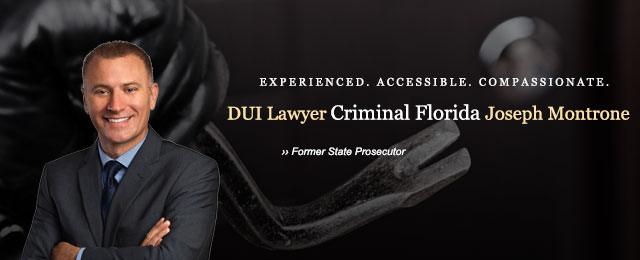St. Petersburg Attorney Defends Clients Against Felony and Misdemeanor Charges
Pinellas County criminal defense lawyer provides strong counsel
Dealing effectively with a criminal charge requires the assistance of a proven attorney who can guide you through the challenges that lie ahead. At the law office of Joseph Montrone, Jr., P.A., I take pride in helping people who face difficult times, making sure they know that someone is looking out for their best interests. From my office in St. Petersburg, my firm defends Floridians in a wide range of criminal matters. My goal is to make sure you understand what is happening, offer straight answers to your questions and fight hard for your acquittal or lessen the impact of any plea or verdict you face.
What is the difference between a felony and misdemeanor charge in Florida?
All crimes are serious matters that need immediate attention. Florida, like other states, classifies certain crimes as misdemeanors and more serious criminal conduct as felonies. Felony convictions can result in a sentence of larger fines and prison time lasting more than one year. Misdemeanors are punishable by a jail sentence of up to one year. In both cases, additional punishments, such as fines, probation and community service can be imposed. The same type of crime can be a misdemeanor in certain situations and a felony in others depending on the particular circumstances.
Examples of frequently charged felonies and misdemeanors
My firm handles all types of felony and misdemeanor defense cases, including matters stemming from the following alleged offenses:
- Assault and battery — In Florida, assault and battery refers to two distinct types of misconduct. An assault is a threat of violence perpetrated by someone with the ability to do so, while a battery requires unwanted physical contact.
- Drunk driving — Though most DUI cases are prosecuted as misdemeanors, felony charges can be brought against multiple offenders or in cases where an allegedly intoxicated motorist has caused a serious injury.
- Drug crimes — While some drug charges associated with the possession of controlled substances are classified as misdemeanors, an indication that drugs are being sold can trigger a distribution or trafficking count.
- Sex crimes — I strive to safeguard the rights of people charged with sex crimes so they can avoid unwarranted prison sentences and inclusion within the state’s sex offender registry.
- Weapons offenses — State and federal laws on weapons frequently change, and a failure to comply with the current rules might trigger substantial charges.
- Domestic violence — Various specific offenses can be considered as domestic violence under Florida law if the purported victim is a relationship partner or household member. My firm advocates for clients in both criminal and civil proceedings.
- Theft and property crimes — The value of property you are charged with stealing will determine whether you face felony or misdemeanor charges. Petit theft of less than $750 is generally a misdemeanor but prior convictions on other theft and property crimes may, in certain circumstances, lead to a felony charge.
Whatever your case entails, I will develop a strong case to counter the allegations against you. My firm also advises on matters within the juvenile justice system.
Degrees of charges and penalties
Most felonies are divided into three categories of severity. Felonies of the first degree, such as drug trafficking and aggravated child abuse, carry a maximum 30-year sentence. Second-degree felonies can be punished by up to 15 years’ incarceration, and someone convicted of a third-degree could face up to five years behind bars. Extremely serious crimes, including sexual assault of a young child, could subject a defendant to life in prison. First-degree murder might be charged as a capital felony, where a death sentence is possible.
There are two classes of misdemeanors. Conviction of a first-degree misdemeanor could lead to a jail sentence lasting up to one year, while maximum incarceration for a second-degree misdemeanor is 60 days. Punishment in criminal cases can also include fines, community service, probation, community service and mandatory substance abuse treatment.
Statutes of limitations for different types of offenses
Florida employs several different statutes of limitations for criminal offenses. There is no time limit on charges for murder, manslaughter or sexual battery that can result in life imprisonment. Most other first-degree felonies have a four-year statute of limitations, with the timeframe cut to three years for second- and third-degree felonies. Charges in first-degree misdemeanor matters must be filed within two years of the alleged misconduct. For second-degree felonies and violations, the statute of limitations is one year.
Contact a St. Petersburg, FL criminal defense attorney to help you today
Joseph Montrone, Jr., P.A. in St. Petersburg represents accused individuals in all types of Florida felony and misdemeanor criminal cases. Please call {PHONE} or contact me online for a free consultation.

